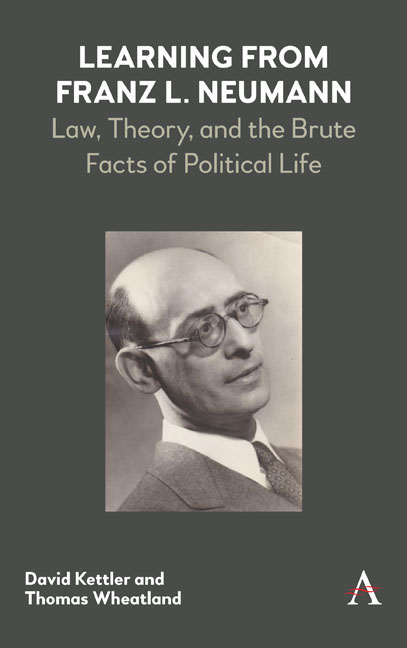Book contents
- Frontmatter
- Contents
- Chapter 1 The Challenge of Franz L. Neumann
- Chapter 2 Social Constitution, Social Power and Responsibility: Neumann and Labor Advocacy
- Chapter 3 Power, Resistance and Constitutions
- Chapter 4 Franz Neumann's Commemoration of Exile
- Chapter 5 After Weimar: The First Exile
- Chapter 6 Neumann's Second Exile: Negotiating the Politics of Research
- Chapter 7 No Happy End: Unprofitable Negotiations
- Chapter 8 Behemoth: Wars Can Be Lost
- Chapter 9 Franz Neumann in Washington: The Political Intellectual at War
- Chapter 10 Franz Neumann in the University: La guerre est finie
- Chapter 11 The Legacy: Four Studies
- Conclusion
- Index
Chapter 2 - Social Constitution, Social Power and Responsibility: Neumann and Labor Advocacy
Published online by Cambridge University Press: 06 September 2019
- Frontmatter
- Contents
- Chapter 1 The Challenge of Franz L. Neumann
- Chapter 2 Social Constitution, Social Power and Responsibility: Neumann and Labor Advocacy
- Chapter 3 Power, Resistance and Constitutions
- Chapter 4 Franz Neumann's Commemoration of Exile
- Chapter 5 After Weimar: The First Exile
- Chapter 6 Neumann's Second Exile: Negotiating the Politics of Research
- Chapter 7 No Happy End: Unprofitable Negotiations
- Chapter 8 Behemoth: Wars Can Be Lost
- Chapter 9 Franz Neumann in Washington: The Political Intellectual at War
- Chapter 10 Franz Neumann in the University: La guerre est finie
- Chapter 11 The Legacy: Four Studies
- Conclusion
- Index
Summary
Marxism and Law
In a memorial delivered, as dictated by convention, by the head of his Columbia department to the assembled council of the Faculty of Political Science soon after Neumann's death, but written in quite an unconventional, almost confrontational manner by Neumann's closest friend, Herbert Marcuse, it is said of him that he “was a scholar for whom political science was closely linked to political action.” His lifelong cause, according to the friend who knew best how he would want to be remembered, even in this academic setting, was to reverse the Weimar failure of social democracy, and his most pressing concern was the condition of his time. If all political exiles, in the full sense of the word, have been active in some public space before their displacement, a distinct location must be reserved for figures like Neumann, whose adult years before exile were so profoundly engaged in the preeminent project of the place from which he was banished. In such cases, the activities of exile cannot be understood without close attention to the earlier enterprise.
According to the second of Karl Marx's Theses on Feuerbach, “Man must prove the truth, i.e., the reality and power, the this- sidedness of his thinking, in practice” (229). This familiar quotation from the author who was the subject of one of Neumann's last semester- long seminars at Columbia and whose theoretical contributions he promoted with surprising enthusiasm there in the McCarthyite Spring of 1953 may be read as a gloss on Neumann's resolution to deal, as a political intellectual, with the “brute realities of politics” while fighting “for a better political system.” The great and continuing strength of Neumann's work as achievement and model is its alertness, despite the profound importance he attaches to the great theoretical structures of rational political thought, to the distracting evidence of discordant developments in the practical world, as encountered in his practical projects. Neither in his legal nor in his political analyses was he prepared to reify the broad designs or general trends that figure in theory— not even in the theory he valued the most.
- Type
- Chapter
- Information
- Learning from Franz L. NeumannLaw, Theory, and the Brute Facts of Political Life, pp. 9 - 44Publisher: Anthem PressPrint publication year: 2019



